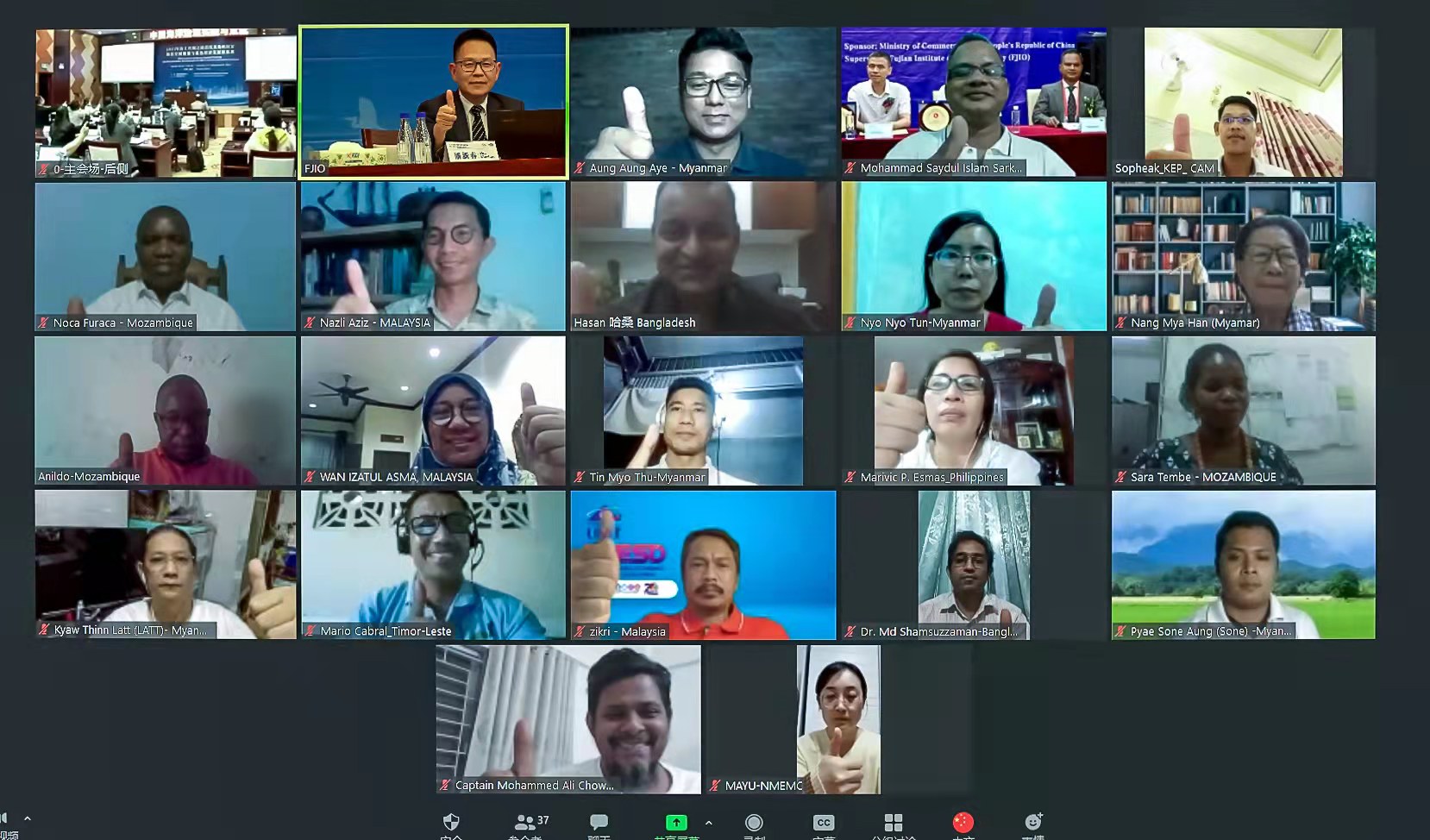News
On the afternoon of November 11, 2021, the workshop on Marine Spatial Planning and Blue Economy Development in the Maritime Silk Road Countries (hereinafter referred to as the Workshop) sponsored by China Oceanic Development Foundation (hereinafter referred to as the Foundation) and undertaken by Fujian Institute of Oceanography (hereinafter referred to as the Institute of Oceanography) was officially launched. Pan Xinchun, Vice Chairman and Secretary-General of the Foundation, You Jiansheng, Deputy Director of Fujian Science and Technology Department, Lian Zhangfei, Director of the Institute, and Chi Xincai, first-class researcher of Xiamen Ocean Development Bureau attended the opening ceremony and delivered speeches. More than 80 participants from 15 countries, including China, East Timor, the Philippines, Cambodia, Malaysia, Bangladesh, Myanmar, Vietnam, Guinea-Bissau, Comoros, Madagascar, Mozambique, South Africa, Costa Rica, and Papua New Guinea, will take part in this workshop through a combination of offline and online. The workshop will last for two weeks (November 11-24). The courses include China's marine system, marine capacity, spatial planning, marine development, environmental protection, ecological construction, marine economy, digital ocean, culture and education, and typical cases. Leaders and experts rich in theoretical accomplishment and practical experience are invited to give lectures. Participants will study closely, communicate actively, discuss in interaction, and friendly develop their relationships and cooperation.
 The opening ceremony of the workshop
The opening ceremony of the workshop
Pan Xinchun said in his speech that there are two purposes for holding this workshop. First, through further study and understanding of the content, purpose, significance, and operation essentials of the Maritime Silk Road Project of "Promoting Marine Spatial Planning and Contributing to Blue Economy Development” (hereinafter referred to as the Maritime Silk Road Project), participants will solidly promote the implementation, realization and prosperity of the Maritime Silk Road Project in countries and island countries along the Maritime Silk Road to benefit the people and develop the countries; Second, by learning from the successful experience of China's marine governance and marine economic development, participants will be provided with references and examples to plan their own marine governance and marine economic development.
 A group photo of some Chinese participants in the workshop
A group photo of some Chinese participants in the workshop
Pan Xinchun pointed out that the Maritime Silk Road Project is a major project established, funded, led, and organized by the Foundation under the concept of "a Community with a Shared Future for Mankind" and "a Maritime Community with a Shared Future" put forward by President Xi Jinping, a major engineering to promote the construction of the Belt and Road Initiative and the building of a blue partnership, as well as a major action to finance the rapid development of the marine economy of countries and island countries along the Maritime Silk Road and demonstrate the role of the Foundation as a responsible and big foundation of China. The Foundation has signed cooperation agreements with 18 Maritime Silk Road countries, covering marine governance, ecological protection, resource development, industrial layout, economic development, scientific and technological research, urban construction, personnel training, and many other aspects, and the work is being comprehensively promoted.
Pan Xinchun said that the Maritime Silk Road Project will be in line with the contents and requirements of 205 cooperation documents signed by Chinese government and 171 countries and international organizations to jointly build the Belt and Road Initiative, be coincide with the infrastructure such as roads, railways, bridges, ports, airports, power stations, communication, environmental protection, etc. of countries and island countries along the Maritime Silk Road in the Belt and Road Initiative co-construction, be linked to the industrial chain, supply chain, capital chain and other areas, and strive to break through the obstruction of ideology, social system, religious belief, and cultural differences, building the Maritime Silk Road Project into a good project and a new engine to drive the economic development, increase employment, improve people's livelihood and increase tax revenue of the countries and island countries along the Maritime Silk Road.
Pan Xinchun emphasized that the courses arranged in this workshop such as the Chinese solution for marine governance are invaluable and are the crystallization of the wisdom and sweat of the Chinese people who have been constantly explored, practiced, summarized, and struggled for 72 years. He put forward two hopes for the participants in this workshop. First, it is hoped that the participants will deeply understand the rich connotation and significance of the Maritime Silk Road Project through study, arm their minds, increase their confidence, master the essentials, and enhance their initiative, enthusiasm and creativity in implementing the Maritime Silk Road Project; Second, it is hoped that after the participants back to their respective posts, they could focus on the following aspects in the implementation of the Maritime Silk Road Project: First, focus on the organization and implementation of the establishment and improvement of a sound coordination mechanism and special work team for the Maritime Silk Road Project; Second, make every effort to obtain the required information through collection and marine investigation to meet the requirements of spatial planning preparation and marine governance system formulation; Third, find out the comparative advantages of the development of the countries for the Maritime Silk Road Project and connect with the Chinese market to catch up with the express train of China’s development; Fourth, protect the marine ecological environment and designate valuable marine ecosystems as protected areas; Fifth, divide the living space, production space, and ecological space and rationally determine the industrial layout and urban construction; Sixth, promote investment attraction, introduce relevant Chinese enterprises to invest, and provide services for investors; Seventh, focus on scientific and technological cooperation and research, including biodiversity, ecological protection, climate change, marine monitoring, etc.; Eighth, strengthen the training of talents, including short-term training, visiting scholars and studying in China; Ninth, make up for the shortcomings of the system and help to establish marine management system and information system; Tenth, efforts should be made to promote the implementation of the planning, and the governments of the Maritime Silk Road Project countries should approve the planning and used it as the basis for marine development and protection, economic development, and coastal town construction.
 Online group photo of some Chinese and foreign participants in the workshop
Online group photo of some Chinese and foreign participants in the workshop
It took five hours for Pan Xinchun to lecture the first two classes in the workshop, with the topics of "Practice and Achievements of China's Marine Governance" and "Significance, Content and Application of Maritime Silk Road Project". After class, Chinese and foreign participants were scrambling to ask questions online and offline and did not want to stop until 10:00 pm. Pan Xinchun took his own work experience as an example, patiently, meticulously, and lively answered them one by one. The participants smiled and nodded, gave praises with thumb up, and expressed their gratitude in their own languages.

- Marine Spatial Planning Study Tour 2023 Officially Launched
- President Lv Bin Met with Her Royal Highness of Tonga Pilolevu Tuita in Beijing and Signed a Memorandum of Understanding on Cooperation
- Dialogue eyes key role of youth in RCEP region's growth
- Pan Xinchun Attends the 2022 China Ocean Action Roundtable and Introduces Ten Major Actions



 Home
Home  About Us
About Us  Our Programs
Our Programs  Cooperative Partner
Cooperative Partner